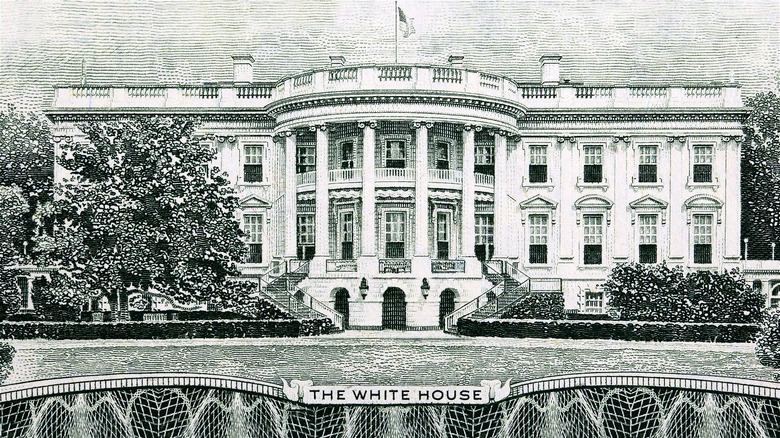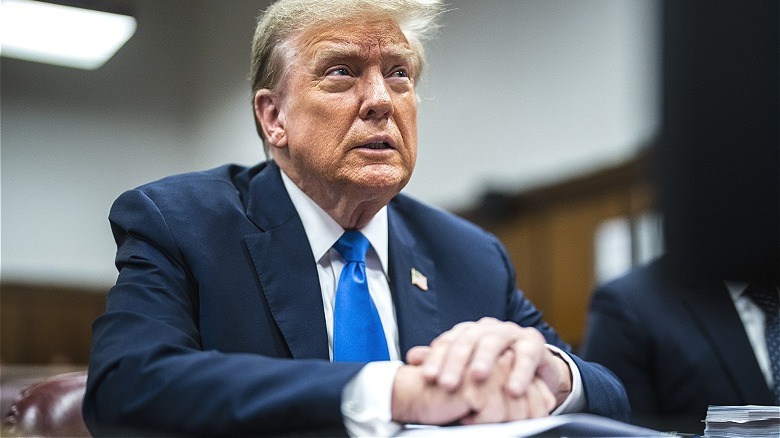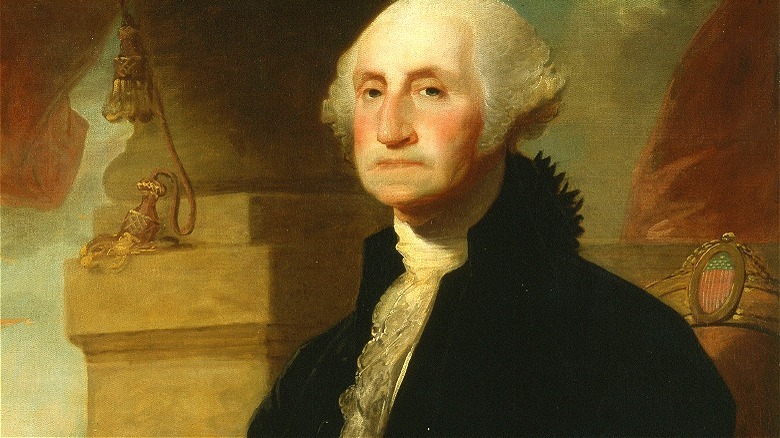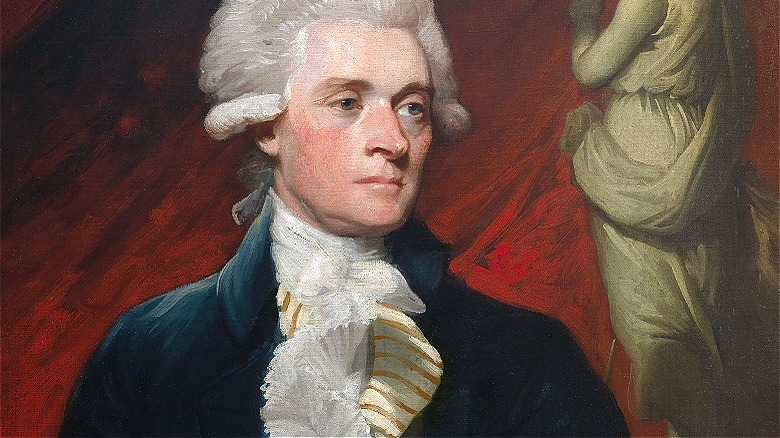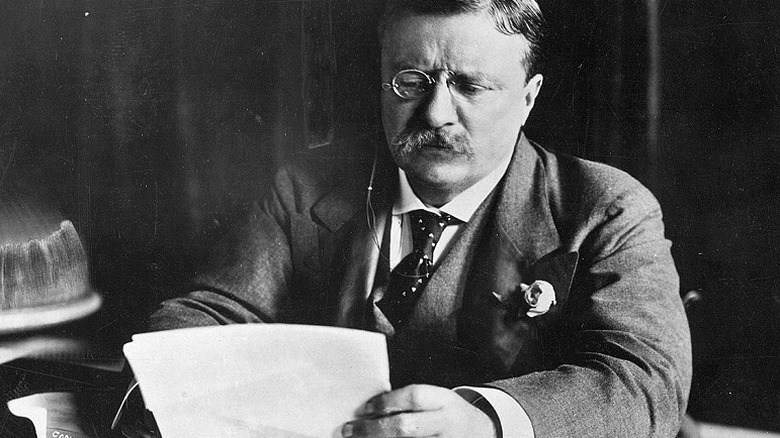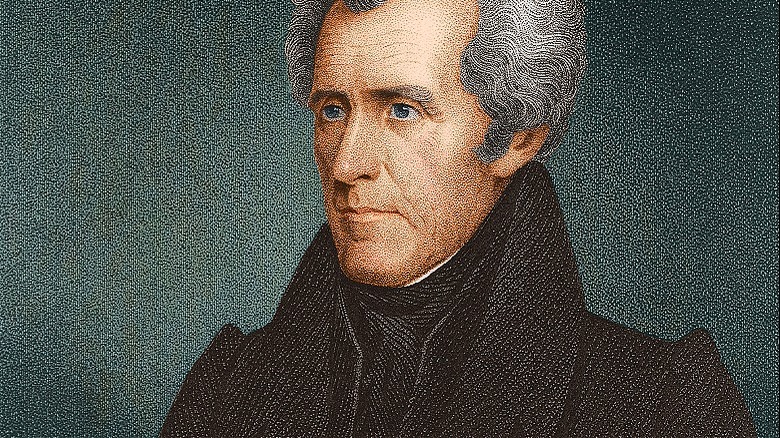Who Are The Richest US Presidents Of All Time?
While part of the American dream is the idea that anyone can become president, the increasingly expensive campaigning required to make that idea a reality can make it feel like only the rich can participate. This idea isn't helped by the sheer amount of wealthy men who end up in the White House. Now, that doesn't mean the country has never had presidents from more humble beginnings, only that it's far more likely that presidents will come from a certain socioeconomic status. As Larry Sabato, director of the University of Virginia's Center for Politics, explained to NPR, "I still think it is possible for a person of modest means to become president — if the conditions are just right." You might also be surprised to learn that the idea that a presidential candidate must be wealthy is by no means new, but instead goes back to the founding of the country.
It's worth mentioning that all of the top five wealthiest presidents in United States history came from family money, meaning they inherited some, or all, of their fortune from their families as opposed to the American ideal of self-made success. According to Sabato, "[...] wealth has always been a major qualifying factor for the presidency. It gives you access to the other rich people who fund campaigns, the status to seek high office, the extra time necessary for an all-consuming quest, and freedom from the everyday concerns that keep most people occupied. Thus has it always been, thus ever will it be."
Donald Trump
Despite the fact it's incredibly difficult to get an accurate estimate of Donald Trump's net worth (due to wide variability among both press estimates and FEC disclosures), even the lowest estimates still place him far and away above the next richest president in U.S. history. While it's extremely unlikely that his personal claim of having a net worth of $10 billion is actually accurate, media estimates are still quite high. In March 2024, Bloomberg estimated Trump's net worth at $6.5 billion following his recent Trump Media merger (you can learn more about why the Truth Social IPO is worth billions here), while Forbes has estimated it at around $6.4 billion.
Regardless of the exact amount, the main thing to know about Trump's fortune is that it was largely inherited. His father was a wealthy real estate developer, and through a series of tax dodges, was able to funnel at least $413 million to his son, Donald Trump, according to an analysis by The New York Times. From disguised gifts to sham corporations to improper tax deductions, Trump was already earning $200,000 a year (in today's dollars) by the time he was just 3 years old, per the Times, and was officially a millionaire by the time he was 8.
With this money, Trump created multiple companies across business, real estate, and hospitality, including The Trump Organization. It's worth noting that the 45th president of the United States has declared bankruptcy for six different businesses but continues to have an exorbitant net worth. His current holdings include golf courses, hotels, skyscrapers, and wineries.
George Washington
Without a debt, most historians agree that one of the wealthiest presidents in United States history was George Washington. Washington is estimated to have been worth the equivalent of $525 million today, while other estimates put his net worth closer to $587 million. Unlike in more contemporary times, much of Washington's wealth was rooted in property and land value. However, estimates of his total net worth are ultimately incomplete due to several key missing valuations such as the lack of an assigned market value for the 7,000-acre Mount Vernon estate (in addition to the hundreds of slaves who worked on it).
You might be surprised to learn that George Washington's fortune was only partly a result of his inherited wealth (for instance, he inherited Mount Vernon from a half-brother) and that a substantial amount of his net worth was actually the result of his future wife, Martha. An exceptionally wealthy widow, Martha ended up contributing a significant portion of Washington's fortune once they were married. It's also worth mentioning that Washington's position as a government surveyor gave him an unfair advantage when it came to land speculation, which further helped his property holdings and net worth.
Washington kept fairly diverse business holdings, everything from hemp production to a distillery, which helped to ensure his inherited wealth continued to grow. Also, as president, Washington earned $25,000 annually, the equivalent of 2% of the country's entire budget in 1789.
Thomas Jefferson
Another of our Founding Fathers makes the list of richest Presidents in U.S. history. However, unlike Washington, Jefferson's elaborate spending habits ultimately left his family destitute upon his death. Jefferson inherited roughly $234 million (in today's dollars) from his father. Through land speculation and a series of government jobs, Jefferson was able to grow his initially inherited fortune, even building the famed Monticello home, before losing it all. Jefferson enjoyed a multitude of expensive habits that included lavish entertainment, fine foods, exorbitant land acquisitions, and even collecting rare books. His lifestyle meant that, despite being land-rich he was cash-poor and deeply in debt. As he continued to purchase land acquisitions beyond the means of his plantation, his debt continued to grow.
Jefferson was able to fend off total financial ruin through random opportunities to sell off some of his collections. For instance, after the British burned down the U.S. Capitol and Congressional Library in 1814, Jefferson sold a whopping 6,487 volumes of books to the federal government in order to reestablish the library. He was paid $23,950 for them in 815 which is the equivalent of about $485,737 in today's dollars. Unfortunately, the first thing Jefferson did after selling his collection was promptly return to collecting more books to replace what he had sold. Upon his death, Jefferson's family was forced to sell not just their home (and accompanying slaves) but also their land, furniture, and jewelry to try and pay back his debts. His family was then forced to live off of charity.
Theodore Roosevelt
With an estimated net worth that would equal $125 million, you're more than likely not surprised to see a Roosevelt on this list. However, you might be interested to know that Teddy Roosevelt actually lost (through a number of bad investments), and eventually recouped, large parts of his fortune during his lifetime — leading to a more tumultuous financial situation than his wealthy businessman father would have predicted. According to historical New York Times print issues, Roosevelt inherited $60,000 in 1878 upon the passing of his father. That amount is equivalent to about $1.3 million today.
The biggest financial loss of Roosevelt's life was due to his investments in cattle ranching in the Dakotas in the mid-1880s. The unsustainable nature of the industry, combined with exceptionally harsh weather led to him losing over half of his cattle crop while flooding damaged his two ranches. He divested from both properties, but not after considerable financial loss. It's worth noting that, while his time in the Dakotas might have ultimately been financially unwise, the time made an important impression on him and is credited with his decision to create the national park system the country still enjoys today.
Roosevelt would go on to make other, more successful, real estate deals in addition to enjoying a successful career as a prolific writer of over 35 books. He also continued working in public service, serving as governor of New York before becoming vice president of the United States (and just six months later, the nation's 26th president) in 1901.
Andrew Jackson
As the president who profited the most from slavery, Andrew Jackson amassed a $119 million fortune during his lifetime. While Jackson was actually born poor, unlike the other presidents on this list, he did still inherit a significant amount of his wealth through his wife, who died just before he took office as president. Jackson was also a prominent lawyer and a famous military commander, which further helped to bolster his wealth. However, it's worth mentioning that the reason Jackson's military service was so lucrative was due to the fact he used his insider knowledge as a military general to swoop in and purchase land belonging to Native Americans as they were being forced onto reservations. As president, Jackson even passed the Indian Removal Act, which further displaced thousands of Native Americans and opened up millions of acres of land for other white settlers to purchase just as Jackson had.
Jackson continued his land speculation, which eventually allowed him to cofound the city of Memphis, create the lavish plantation (and accompanying mansion) known as The Hermitage, and amass upward of 300 slaves in his lifetime. At the time of his death, Jackson had 150 enslaved people working at The Hermitage estate at once. There has been increased scrutiny of Jackson in the last several years, with many arguing his aggressively anti-Native American and pro-slavery stances should disqualify him from certain honors such as his portrait appearing on U.S. currency.
